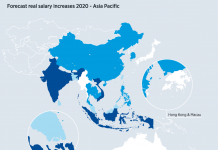Digitisation is arguably the hottest topic of discussion in business spheres around the globe. This is especially so for developing nations who are thriving in the midst of the US-China trade war, as businesses are moving to said nations to avoid the increasing costs at home.
Companies that successfully digitise can expect to optimize their processes as well as see huge gains in efficiency and speed. It is truly vital for contemporary businesses to align their activities with the pace of technological evolution.
On 16 October 2019, Maslow Trainers & Consultants, organised the Human Capital Best Practices (HCBP) conference which took place in Malaysia. This annual event is designed to provide a platform for all business partners and leaders to explore the latest and most cutting-edge best practices of human capital from various sectors and verticals.
Some of the key discussion points included the modernization of HR functions, the digitization of the employee experience, learning & development transformation, talent acquisition, retention & engagement, and many more.
In this shifting digital age, companies must be able to attract and retain talent who are able to support a digital strategy. Even more so now that the world is experiencing a distinct shortage of workers in select fields due to demographics, higher-skill level requirements, and job market globalisation.
Through the digitisation of the employee experience, companies can promote an environment that inspires collaboration through connectivity, digital community, and social collaboration which will enable them to provide a healthier and more productive environment while reducing employee isolation.
Digitisation is no easy task however. As said by Dr Reza Abraham, Chief Operating Officer at Maslow, technology is easy. It is the trends and processes that can be adopted and utilised by businesses to move forwards. On the other hand, digitisation is difficult; because it involves a change of mindset, culture and environment. It is a paradigm shift into a new age that changes the way we conduct business and is brutal for those that resist it.
This is affirmed by Monir Azzouzi, Head of Employee Experience & Branding at Gojek Indonesia; who was also in attendance. He confirms that the HR landscape has change significantly over the past two decades; specially when considering the digital transformation process. As it has become increasingly apparent, digitisation is not just the increased utilisation of technology to improve productivity and efficiency.
Also discussed were the challenges that businesses and nations faced when trying to implement digital transformations. All over the world, most HR professionals are either not ready or capable to bring the corporate entity along on the digital transformation journey. Monir credits this issue as being a product of the drastically different requirements that HR needs to fulfil today compared to the past.
This digital age is a new paradigm that that all must catch up to. For all we know, the future might bring a whole new suite of innovations and prospects that might shake the business ecosystem once more/ But for now, digitisation is still young and is here to stay. It is only matter of time before more people take notice and elevate HR to the optimal level it needs to be to make the most out of this era.






















